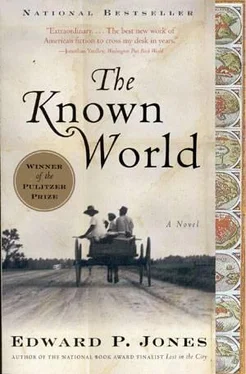Counsel said nothing; he thought it was just like John not to know when he was working on his side.
Skiffington turned back to Mildred. “I have not come all this way to be denied.” The nerves all about the tooth pounded back, and Skiffington forced his words through a nearly closed mouth. “I have not come all this way to be denied by a… by a nigger. Do you hear me, Mildred? No nigger will stand between me and my duty.” He closed his mouth completely to collect himself, and a minute later he spoke again. “I have a right to do what is right, and no nigger can stand and oppose that right.” He had always tried to be civil, so why was she making him uncivil? Counsel did not move but kept his eyes on Mildred. “I have a duty to uphold,” Skiffington said. “That’s all there is to it.”
Now Counsel said, “We have a duty to uphold.”
Skiffington was glad that Counsel had spoken to reaffirm why they were there. He eased his rifle out of the sheaf, his finger on the trigger. “Surrender the property,” Counsel said, and Skiffington made a quick movement to pull the rifle the rest of the way out of the sheaf and as he did, the rifle fired.
The shot first hit one of Mildred’s knuckles, splintering it, and then traveled on into her chest, sending her back into the house some two feet, her gun falling loudly in the doorway and scaring the dog, who trotted to the back of the house. As soon as the shot blew Mildred’s heart to bits, she was immediately standing in that doorway. It was late at night and she had been somewhere she could not remember. She went into the dark house and up the stairs and found the door to Henry’s room open. Caldonia was beside him in the bed and she told Mildred that Henry had had a hard time going to sleep but now he was resting quite well. Henry did not stir as his mother looked down on him and Mildred was grateful for that. She left the room and found Augustus in their bed, also asleep, and she got in and made herself comfortable in his arms. The wind was coming through the window just the way she liked it. Good sleepin weather, she always said. But where in the world had she been? Had she been in the garden? Had she been to the well? She closed her eyes and pulled Augustus’s arm closer about her and closed her eyes. She could not remember if she had left the front door open. It did not matter because all their neighbors were good people.
Skiffington and Counsel were silent for a very long time and Skiffington prayed, but once again, the words failed him. Counsel looked at Skiffington, who dropped his rifle, and in the time it took for the rifle to reach the ground, Skiffington’s horse took a few steps away from Counsel and his horse. “What have I asked except civility and righteousness?” Skiffington said. “John?” Counsel said. “John?” “I rise in the morning,” Skiffington continued without hearing Counsel, “and I asked nothing of that nigger, except what is proper and right. No more than that do I ask of any nigger. No more. Who can say I asked for more, Counsel? Name that person this moment who says I asked for more than civility and righteousness for righteousness’ sake. That person has no name because that person does not live. Are civility and righteousness so dear that I cannot have them?” Counsel said, “John? Do you hear me, John?”
“Counsel, I want you to go in there and bring that murderin nigger out here so we can take him to his owner, to his right and proper owner. This has gone on long enough. Every bit of this has gone on long enough.”
“John?”
“Do what I say, Counsel. Uphold the law the way you have been sworn to do, the way we have been sworn to do. Go in and bring that murderer out here. Do what I say or you will be in a wrath of trouble. Act, damn you!”
Counsel dismounted and took out his pistol. He should marry the boardinghouse woman and turn his back forever on being somebody’s deputy, especially deputy to a man he knew he was better than. He stood a foot or more from Mildred’s body and raised his head high and higher to avoid seeing her. Skiffington said, “Counsel, we cannot leave her there like that. I know who that woman is. I know her name. I know her husband.” Counsel held up one foot to step around Mildred but as he did he realized he might step into blood, so he had to look down. Her eyes were not closed and he asked God why he hadn’t done that one small favor for him and closed them. He took a giant step past her. He went through the first floor and his eye caught the green curtain on the side window blowing prettily from a breeze he hadn’t enjoyed out in the front. That was the nature of houses, good breezes from the side and hellish nothing coming in the front and back. He went out to the kitchen. It was such a clean house that no one would have thought a nigger lived there. A bowl of apples sat on the table, and one of them was tilted so that the long stem was pointing directly at Counsel, a kind of suggestion that it should be eaten first. The dog cowered at the back door and when he turned and saw Counsel, the dog began peeing. He opened his mouth to bark but there was no sound. Counsel looked at the dog for nearly a minute, then he went and opened the door for it, and after he had shut it, he thought for the first time since entering the home that he was in the house with a man who had murdered three people. He gripped the pistol tighter.
“Counsel! What are you doing? Bring him out!”
Counsel went back through the kitchen, staying to the side of the front room to avoid Skiffington seeing him. The problem was that the boardinghouse woman was not wealthy. Near the stairs he noticed the rack of walking sticks and found it impossible not to admire them. He reached up and touched one and turned it to better see what Augustus Townsend had carved. If the boardinghouse woman wasn’t barren, he might get one child out of her. One boy was all he needed. Up and down the stick were houses, each amazingly different from the others, big and small houses, foreign houses like in the books in the burned library in North Carolina. Where had a nigger seen such things? The beauty of the walking stick kept him there, and, as if to release its hold on him, he tapped the most foreign-looking of the houses with the barrel of his gun and then looked toward the stairs. The boardinghouse woman said she was thirty-seven, but the lines on her upper lip seemed to tell him something much older.
“Counsel!”
“I’m going to look upstairs now, John.”
“Then do it and bring him!”
The stairs did not creak. One more strange thing about the nature of houses-some creaked, some did not, and there wasn’t any use thinking you could say which was which just by looking at them. A two-story nothing in Mississippi had stairs that didn’t make a sound. His destroyed house was one of the finest in North Carolina, in the South, and all the stairs in it had creaked, even the ones going up from the kitchen in the back that were used mostly by the servants and his children. All of them people of light feet.
On the second floor he looked in each room and as he neared the last, Mildred and Augustus’s bedroom, his disappointment grew. If the slave was not here, there would be no living with John’s rage. He stood in the middle of the couple’s bedroom and cursed. “Counsel! We can’t leave Mildred laying there like that.” Counsel opened the top drawer of the dresser beside the door and moved things around with the barrel of his gun and then he heard a clinking. In the folds of a small bolt of yellow cloth he found five twenty-dollar gold pieces. He laughed and looked around, then laughed some more and put the money in his pocket. He went through the rest of the drawers, tore the bed apart, stamped on the floor to see what boards might be covering some hiding place. He found no more gold, but he knew there was more, knew that those two niggers had been out here with a white man’s riches. He looked again around the room, but now with a new eye, the eye of a man who knew salvation and deliverance were very close by. He needed time to search the house, the land, and he did not have that time right then. “Counsel!” There might or might not be enough to share with another man, but he did not want to risk telling Skiffington. His cousin might say it was not theirs to have. There might well be enough to get him where he was before the devastation in North Carolina. No, it would be best not to tell John. What does God’s monkey John Skiffington know about money and need and the loss of family?
Читать дальше












